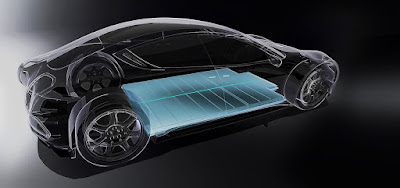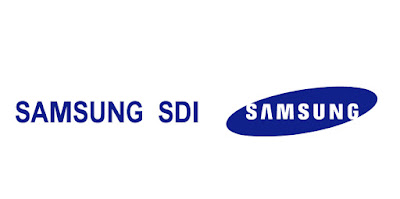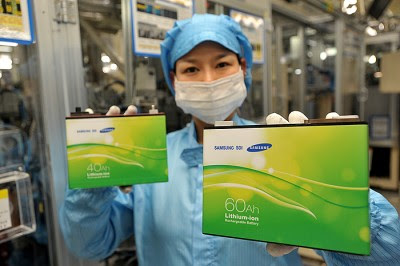Compared to widely used lithium-ion batteries, which utilize liquid electrolytes, all-solid-state batteries support greater energy density, which opens the door for larger capacities, and utilize solid electrolytes, which are demonstrably safer. However, the lithium metal anodes that are frequently used in all-solid-state batteries, are prone to trigger the growth of dendrites1 which can produce undesirable side effects that reduce a battery’s lifespan and safety.
To overcome those effects, Samsung’s researchers proposed utilizing, for the first time, a silver-carbon (Ag-C) composite layer as the anode. The team found that incorporating an Ag-C layer into a prototype pouch cell enabled the battery to support a larger capacity, a longer cycle life, and enhanced its overall safety. Measuring just 5µm (micrometers) thick, the ultrathin Ag-C nanocomposite layer allowed the team to reduce anode thickness and increase energy density up to 900Wh/L. It also enabled them to make their prototype approximately 50 percent smaller by volume than a conventional lithium-ion battery.
This promising research is expected to help drive the expansion of electric vehicles (EVs). The prototype pouch cell that the team developed would enable an EV to travel up to 800km on a single charge, and features a cycle life of over 1,000 charges.
As Dongmin Im, Master at SAIT’s Next Generation Battery Lab and the leader of the project explained, “The product of this study could be a seed technology for safer, high-performance batteries of the future. Going forward, we will continue to develop and refine all-solid-state battery materials and manufacturing technologies to help take EV battery innovation to the next level.”



 BMW sold more than 100,000 cars with plugs last year, adding together its battery-electric and plug-in hybrid models. That's roughly on a par with Tesla, and ahead of both General Motors and Nissan, two other pioneers in modern electric cars. The company has put far more plug-in cars on the road to date than its German counterparts, both Daimler...
BMW sold more than 100,000 cars with plugs last year, adding together its battery-electric and plug-in hybrid models. That's roughly on a par with Tesla, and ahead of both General Motors and Nissan, two other pioneers in modern electric cars. The company has put far more plug-in cars on the road to date than its German counterparts, both Daimler... 
 For a company that has only two battery-electric models in production, both several years old, VW Group spends a great deal of time talking about electric cars. The company has plans to launch 30 new electric vehicles by 2025, and has released four Volkswagen ID concepts, the first of which will enter production in November 2019. At its annual...
For a company that has only two battery-electric models in production, both several years old, VW Group spends a great deal of time talking about electric cars. The company has plans to launch 30 new electric vehicles by 2025, and has released four Volkswagen ID concepts, the first of which will enter production in November 2019. At its annual...  Frequently, cars withdrawn from one market live on in another, sometimes for years. Those vehicles may even be upgraded with newer technology in the older body. Consider that the first-generation Volkswagen Golf launched in 1974, for example, lived on in South Africa until 2009 as the VW CitiGolf. DON'T MISS: 2009 VW CitiGolf: Driving a Brand-New...
Frequently, cars withdrawn from one market live on in another, sometimes for years. Those vehicles may even be upgraded with newer technology in the older body. Consider that the first-generation Volkswagen Golf launched in 1974, for example, lived on in South Africa until 2009 as the VW CitiGolf. DON'T MISS: 2009 VW CitiGolf: Driving a Brand-New...  The limitations of current lithium-ion battery-cell technology pose a hindrance to more widespread adoption of plug-in electric cars. Relatively short ranges and long charging times accorded by current lithium-ion cells still limit the appeal of electric cars in the minds of many new-car buyers. Now Samsung SDI—the South Korean electronics...
The limitations of current lithium-ion battery-cell technology pose a hindrance to more widespread adoption of plug-in electric cars. Relatively short ranges and long charging times accorded by current lithium-ion cells still limit the appeal of electric cars in the minds of many new-car buyers. Now Samsung SDI—the South Korean electronics...  From small startups to major established automakers, many companies have Tesla Motors in their sights. But Lucid Motors—the California-based startup formerly known as Atieva—may have the biggest guns in its arsenal of any of Tesla's would-be rivals. The company plans to unveil its previously-teased electric "executive sedan" December...
From small startups to major established automakers, many companies have Tesla Motors in their sights. But Lucid Motors—the California-based startup formerly known as Atieva—may have the biggest guns in its arsenal of any of Tesla's would-be rivals. The company plans to unveil its previously-teased electric "executive sedan" December... 



